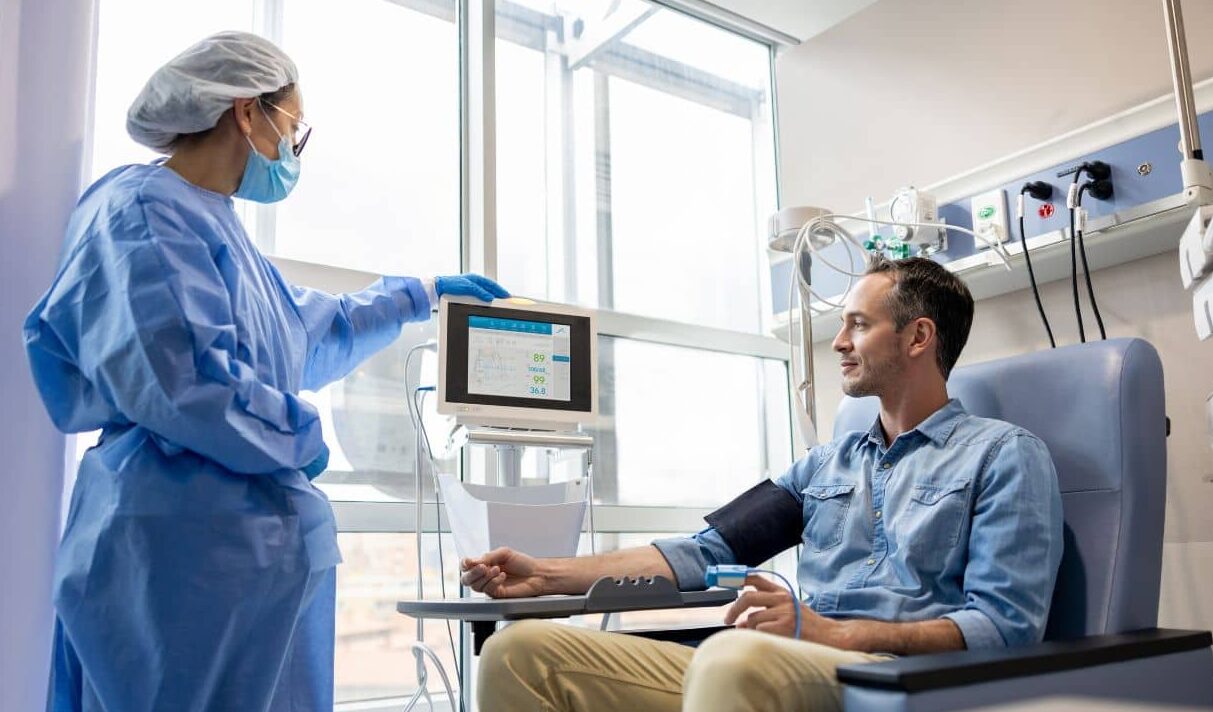-
 News
When glucose levels are low, chemotherapy ceases to affect cancer cells
News
When glucose levels are low, chemotherapy ceases to affect cancer cells
-
 News
Excessive treatment of prostate cancer in older men may reduce quality of life without increasing its duration
News
Excessive treatment of prostate cancer in older men may reduce quality of life without increasing its duration
-
 News
Brain cancer can be cured by viruses
News
Brain cancer can be cured by viruses
-
 News
Ways to reduce lymphatic pain in breast cancer have been found
News
Ways to reduce lymphatic pain in breast cancer have been found
-
 News
Scientists have turned bacteria into a powerful weapon against cancer
News
Scientists have turned bacteria into a powerful weapon against cancer
All news
Surgery clinics in Germany
German surgeons made a huge contribution to the development of medicine in the 19th and 20th centuries and continue to hold the world leadership in the field of surgical quality.
Many celebrities and wealthy people from all over the world prefer to be operated on in Germany.
This is primarily due to:
- Use of all modern operational technologies;
- Individual choice of optimal tactics of the operation;
- Careful planning of interventions;
- Use of high-tech equipment during operation;
- The minimum percentage of postoperative complications;
- Fast postoperative recovery.
The main goal of surgical intervention in Germany is the most effective result with minimal trauma. The preservation of the organ and its functions is the main task of German surgeons, which in most cases can be successfully dealt with.
MedTour patients recommend clinics for the treatment of surgical in Germany:
Doctors for the treatment of surgery in Germany
Frequently Asked Questions
Patients often come to Germany for the following reasons:
- Urological operations;
- Gynecological operations;
- Thoracic surgery;
- Maxillofacial surgery;
- Spine surgery;
- Vascular surgery.
To undergo treatment in Germany, you need to leave a request on the MedTour website. The coordinating doctor will help:
- Find a medical facility and the best doctors;
- Make an appointment with the clinic;
- We solve any additional issues related to treatment (collection of medical documents, booking air tickets and accommodation, airport transfers, etc.).
Among the undeniable advantages of surgery in Germany:
- Individual approach to the patient, regardless of the direction of the operation;
- Use of proven surgical techniques;
- An integrated approach: patients undergo not only the surgical treatment itself, but also high-quality postoperative rehabilitation;
- Safe and painless postoperative period under close medical supervision;
- Scientific validity and proven effectiveness of the applied methods of treatment;
- Systematic financial investments of the state in the medical sector (infrastructure, research, various developments, etc.);
- High qualification, professionalism and responsiveness of the clinic staff;
- The possibility of using pharmacological agents of the latest generations.
Germany is the world’s leader in the effectiveness of surgical treatment of diseases. Such achievements are associated with a number of factors:
- Vast experience and high qualifications of German doctors, many of whom combine clinical practice with scientific activity;
- When choosing a method of intervention, preference is given to less traumatic (laparoscopic and endoscopic operations);
- Extensive use of robotic technology, minimizing the likelihood of error during surgery;
- Constantly updated diagnostic, operating and treatment equipment;
- Using only high-quality original medical products and materials;
- The optimal level of preoperative preparation and postoperative care, thanks to which, in German clinics, surgical interventions are often successfully carried out for patients who were “refused” by doctors at the hospitals at their place of residence;
- High achievements of German rehabilitation, allowing patients to return to full life in the shortest possible time.
Diagnostics in clinics in Germany
One of the most important advantages of surgery in Germany is the impeccable diagnostic accuracy. This applies not only to the recognition of the disease and the establishment of an accurate detailed diagnosis, but also to further research, which makes it possible to determine the boundaries of the pathological focus with an accuracy of a millimeter.
Diagnostics in clinics in Germany is 100% accuracy of disease recognition. After the diagnosis, you yourself will be able to answer yourself questions such as:
- How accurately was your diagnosis established earlier?
- Is there any further research required to prescribe adequate treatment?
- Is surgery necessary in this particular case?
- Are there other alternative treatments?
- What is the prognosis after treatment with different methods (statistical data on the likelihood of complete recovery or achieving a stable remission, percentage of relapses, etc.)?
Benefits of surgery in Germany
Thanks to the active use of advanced technologies, surgical procedures in German clinics provide an excellent speed of recovery and save the patient’s life.
Among the undeniable advantages of surgery in Germany:
- Individual approach to the patient, regardless of the direction of the operation;
- Use of proven surgical techniques;
- An integrated approach: patients undergo not only the surgical treatment itself, but also high-quality postoperative rehabilitation;
- Safe and painless postoperative period under close medical supervision;
- Scientific validity and proven effectiveness of the applied methods of treatment;
- Systematic financial investments of the state in the medical sector (infrastructure, research, various developments, etc.);
- High qualification, professionalism and responsiveness of the clinic staff;
- The possibility of using pharmacological agents of the latest generations.
Surgical treatment methods
The peculiarity of surgical treatment in Germany lies primarily in the fact that German surgeons have almost completely abandoned traditional operations, which place a heavy burden on the body and lead to a longer recovery. Currently, minimally invasive operations are used, in which pain and blood loss of the patient are minimized, and the rehabilitation period is significantly reduced.
Laparoscopy
One of the most popular operations in Germany is laparoscopic. Using a device with an optical system, a light source through a 1 cm incision in the navel, the doctor inserts a miniature surgical instrument. The cannula introduces carbon dioxide into the abdominal cavity, which improves the visibility of the organs. The advantage of laparoscopy is faster recovery than with abdominal operations, high aesthetics of suturing.
The method is used in:
- Gynecology (removal of cysts and uterus);
- Operations on the gastrointestinal tract (removal of the gallbladder, polyps and intestinal neoplasms);
- Removal of umbilical hernia, appendicitis;
- Removal of the bladder and prostate gland;
- Partial kidney resection.
Da Vinci robot
The Da Vinci robotic surgical system has been in use since 1999. It consists of a control panel and a video mast. The surgeon controls the four limbs of the robot. They move like a human hand, but with greater amplitude. And modern optics and cameras display the image on the screen and distinguish the thinnest vessels and nerve fibers. The incisions for such operations are up to 2 cm.
In Germany, a surgeon uses a Da Vinci robot to:
- Minimizing pain after surgery;
- Reduced risk of bleeding;
- Reduced length of hospital stay;
- High aesthetics of postoperative sutures;
- Rapid restoration of normal organ activity, such as urinary control.
Microsurgery
The essence of microsurgery is that the doctor uses surgical microscopes that enlarge the operating area 40 times. Modern devices allow to suture vessels and nerves with a diameter of 1-2 mm.
Oncological operations
HIPEC (Hyperthermic intraperitoneal chemotherapy) – hyperthermic intraperitoneal
chemotherapy. This is a modern method, which is a tandem of surgical and medical procedures for the treatment of malignant neoplasms.
In Germany, the surgeon performs HIPEC in two stages. The doctor first removes the tumor. Depending on the degree of damage, proliferation of cancer cells, the surgeon additionally removes part of the organ or the entire organ with adjacent tissues. Then the abdominal cavity is sutured, sutures are applied. A chemotherapy solution with a temperature above 40 ° C is supplied to the affected area. Within an hour, it washes the place where the malignant neoplasm was previously localized. This combined approach (surgery + chemotherapy) increases the chances of defeating cancer. Sometimes one session is enough for patients.
Hyperthermic intraperitoneal chemotherapy is used for:
- Colon and rectal cancer with metastases in the abdominal cavity and invasion of adjacent organs;
- Small bowel cancer;
- Ovarian cancer with a lesion of the peritoneum;
- Metastases to the peritoneum in any other type of cancer.
In the case of oncology, surgery in Germany can also be performed using the PIPAC method – chemotherapy using aerosol intraperitoneal pressure chemotherapy. This is a high pressure aerosol chemotherapy of the abdominal cavity. During minimally invasive surgery, chemotherapy solution is injected directly into the tumor in the abdomen. High blood pressure and cytostatics destroy the malignant neoplasm. After IPAC, the patient requires only 5 days of hospitalization.
The popularity of oncosurgery in Germany is explained by the complex work of oncologists, a modern diagnostic base, which is available in every clinic, differentiated chemotherapy, taking into account the specificity and type of cancer cells. After any surgical intervention, rehabilitation therapists, massage therapists and oncologists offer patients a program of complete restoration of health and social activity.
Published:
Updated:


Information on this webpage verified by the medical expert






